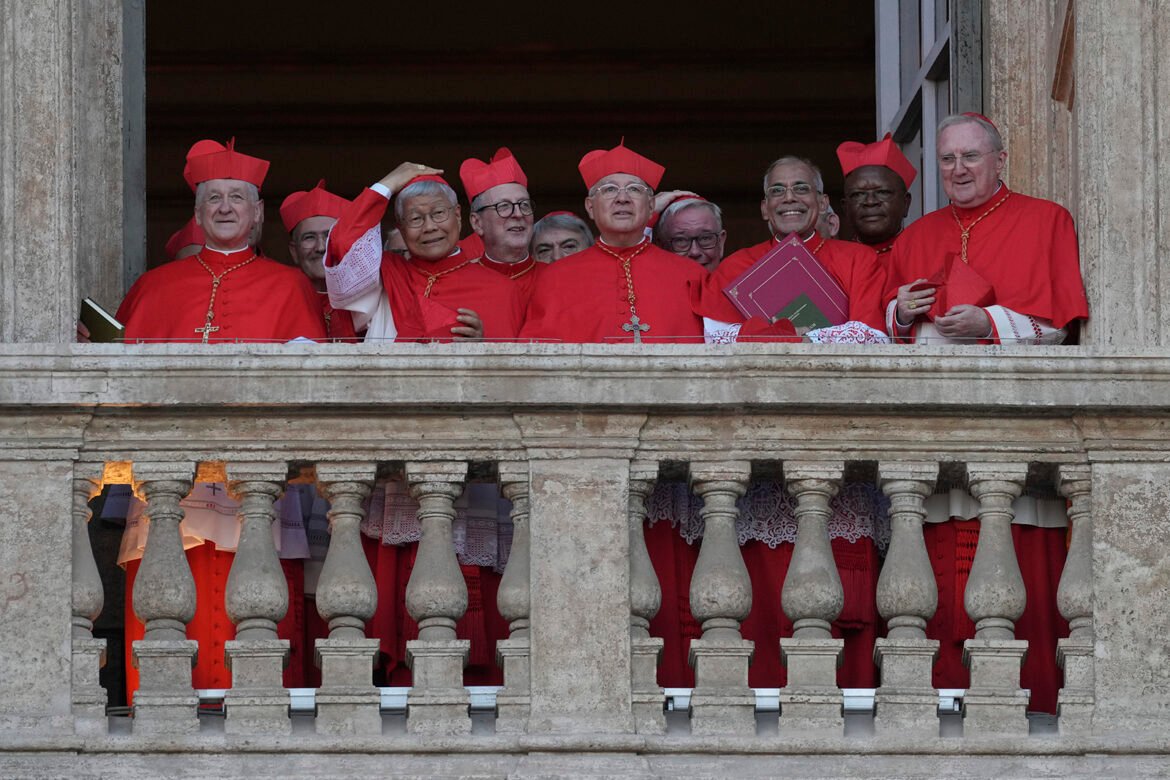(RNS) — Now that the Roman Catholic Church has a new pope, the papabili — the roster of Catholic cardinals who were considered prime candidates for the position — will recede into the background, at least for most of us. As a journalist with reason to watch the process closely, I discovered things about the other contenders that will stick with me long after the conclave itself is a memory. I was impressed and even moved by the wide and deep experiences of its cardinal princes, which merits recognition despite their nonelection.
Here are some erstwhile papabili I will not soon forget:
Cardinal Fridolin Ambongo Besungu
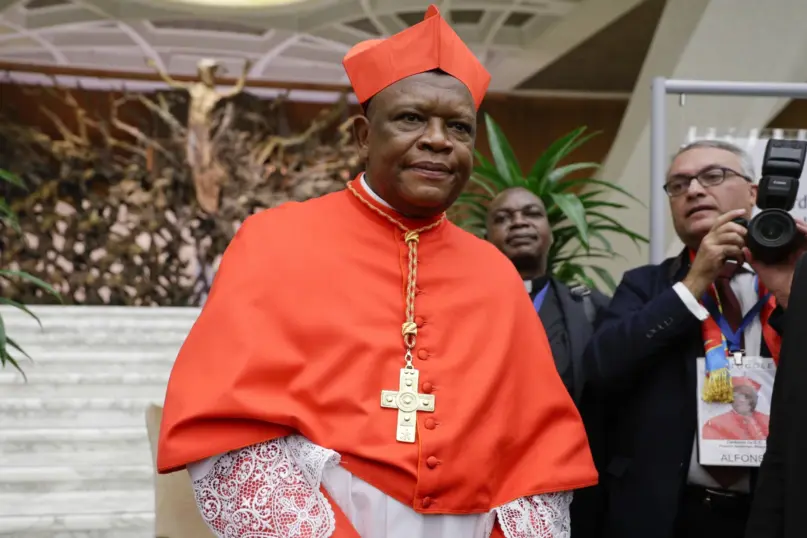
Cardinal Fridolin Ambongo Besungu leaves after receiving the red three-cornered biretta hat from Pope Francis during a consistory inside St. Peter’s Basilica, at the Vatican, Oct. 5, 2019. (AP Photo/Andrew Medichini)
Ambongo’s identification with his continent is manifold; and, it struck me, as early as it could get. His father was a rubber tapper with 11 children to feed. When I threw “rubber tapper” and “children” into Google, it produced a 1904 photograph of a slave in the Belgian Congo staring at a hand and foot of his daughter, which had been amputated because he failed to meet quota.
The extraction of natural resources is a defining narrative of the land where Besengu, archbishop of Kinsasha, is spiritual leader to more than 6 million Catholics. When we in the developed (that is to say, mined-out) countries talk about the environment, we may think about global warming or disappearing species. In Congo, the immediate environment and its treatment are both the hope of the nation and its curse: The eastern part of the country is trapped in a seemingly endless war, involving surrounding countries and more than 100 militias, to determine who controls (among other things) the mineral that makes our cellphones run.
Cardinal Luis Antonio Tagle
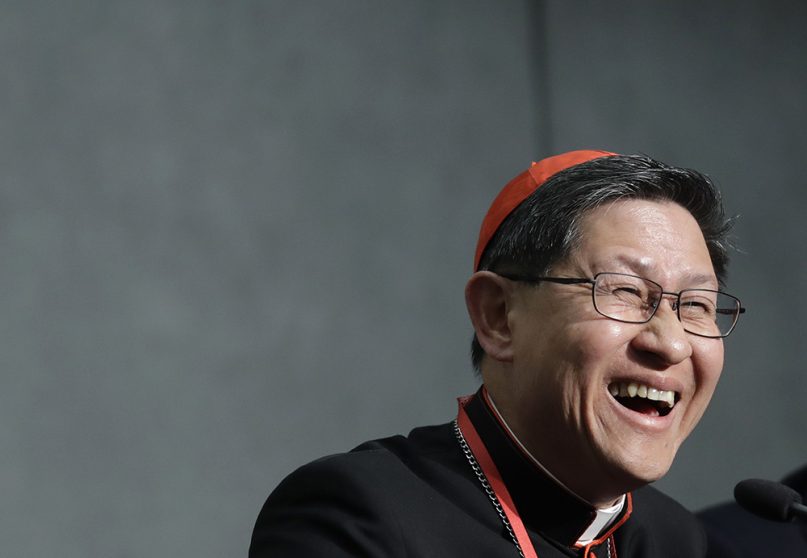
Cardinal Luis Tagle smiles during a news conference on the Synod at the Vatican on Oct. 23, 2018. (AP Photo/Alessandra Tarantino)
My favorite memory of Tagle’s candidacy will be the video of “Chito” warbling a karaoke version of John Lennon’s “Imagine.” Filipinos have more fun, but for Tagle, a world-class scholar, fun was a spiritual asset: A “theologian without humor produces arid, lifeless theology,” he once wrote. “A sense of humor allows you to let go in God.”
The grace in that gift came home to me as I read about Tagle’s time as a graduate student in Washington. Outside of any pastoral obligation, he volunteered at one of Mother Teresa’s facilities, aiding men dying from AIDS and talking to families crippled by shame at their sexual orientation: “One of our jobs,” he said, “was to tell the family when a seropositive person was going to die. We helped them with our prayers and then, when the patient died, we took care of laying out the body.” Sometimes, he wrote, the families refused to see their children until they were no longer alive.
Cardinal Pierbattista Pizzaballa
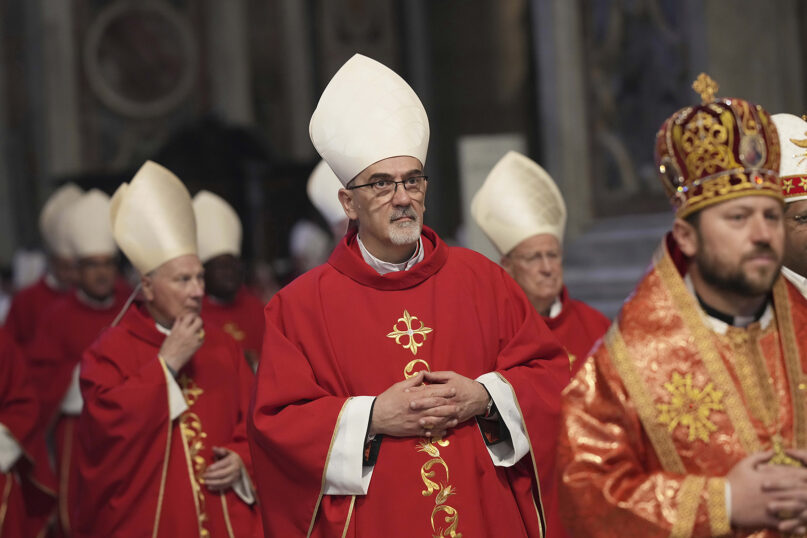
Cardinal Pierbattista Pizzaballa arrives in procession for a Mass on the seventh of nine days of mourning for the late Pope Francis, in St. Peter’s Basilica, at the Vatican, May 2, 2025. (AP Photo/Andrew Medichini)
Pizzaballa, the Latin Patriarch of Jerusalem, has given his life over to one of the most infuriating and intractable theaters of modern geopolitics, the “Holy Land.” His physical bravery was on display when he offered to trade himself for the Hamas hostages; his moral courage, in his excoriation of the Israeli offensive.
Prior to the current catastrophe, he has been able to play the honest broker, offering a frank — and to me, unusual — assessment of the personal cost: “My office then involves a lot of loneliness. If you want to keep yourself free, especially in such a small setting, you also have to be alone. When you have responsibilities … the interpersonal relationships … change. You often suffer, and sometimes you are also forced to disappoint people you love or hold in esteem. You have to take that into account.”
Cardinal Péter Erdő
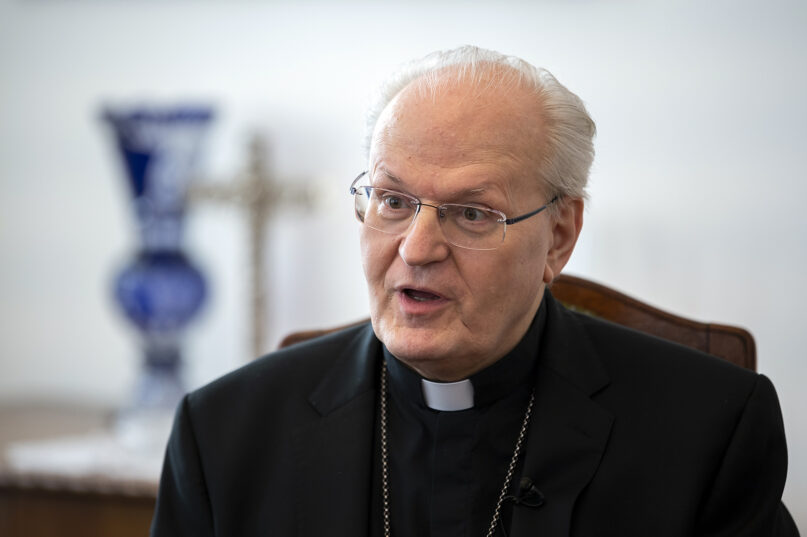
Cardinal Peter Erdő speaks during an interview with The Associated Press, in Budapest, on April 20, 2023. (AP Photo/Denes Erdos)
Erdő was sometimes reduced to a shorthand description: a conservative aligned with authoritarian Hungarian President Victor Orbán (who encouraged that caricature when he bemoaned the church’s failure to make a pope of his countryman, Tamás Bakócz — in 1513). But Erdő’s steadfastness in his interpretation of the faith was in fact forged in Eastern European history, both recent and ancient. Asked about his childhood, he picked a memory from 1956: “It’s not every day that one’s family home is destroyed,” as Soviet tanks did his, when the USSR crushed the 1956 Hungarian uprising.
The Hungarians had expected Western aid in the rebellion, and it had not arrived. He noted that this was only the latest iteration of a centuries-old Hungarian experience “of being abandoned and betrayed by the West, which they had wanted to defend, and to which they felt they belonged.” It reminded me of the kind of eternal present Americans occupy, where the right to worship (or, for that matter, not to worship) is taken for granted: As a draftee in Hungary’s Soviet-aligned army, Erdő also recalled, he could have been punished for carrying a rosary, so he learned to count the mysteries out on the 10 holes in the barrel of his Kalashnikov.
Cardinal Pietro Parolin
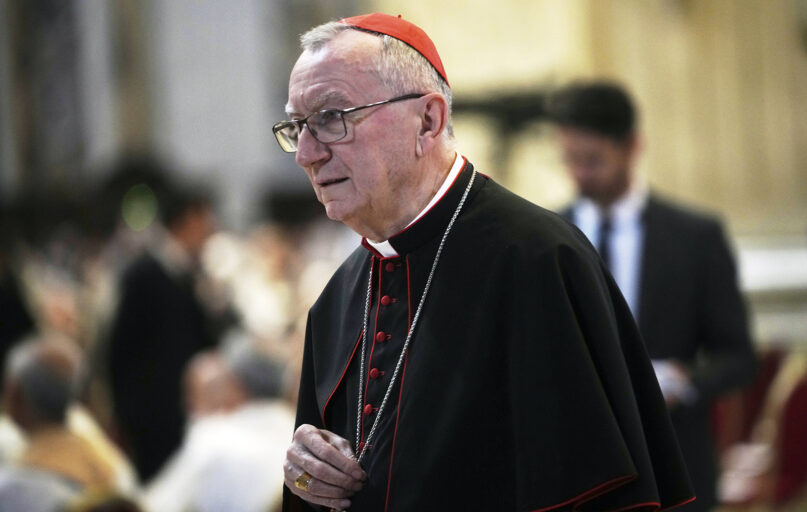
Cardinal Pietro Parolin arrives in St. Peter’s Basilica to attend a Mass of mourning for the late Pope Francis, at the Vatican, May 3, 2025. (AP Photo/Alessandra Tarantino)
Widely declared the most boring of the papabili, this top Vatican official, diplomat and early papal front-runner collected descriptors like “deliberate,” “poker-faced” and “phlegmatic.” The only instance I found when he dropped his guard was last September, when he was scheduled to accompany Francis to Indonesia. Instead, he was in Schiavon, the tiny northern Italian town where he was born, celebrating his mother’s funeral Mass.
Ana Parolin had lived to be 96. Her husband, Luigi, had died 60 years earlier in a car accident. Ana had fallen in love with Luigi, her son said at her funeral, when she heard him praying. “Which is not the way things happen today,” Parolin said. Now, the son told a congregation of childhood friends and church members, “they meet again … in an embrace that no one will ever be able to dissolve, and which will last for eternity.” And Parolin wept.
One more thought, for the winner:
We’ve learned a tremendous number of remarkable things about the first American pope. I have a favorite quotation. In a eulogy for a fellow Augustinian in 2013, then-Father Robert Prevost opened: “Mother Teresa once said, ‘We cannot do great things in life. Only small things with great love.’ This may or may not be true, but we have certainly had the privilege of seeing some great things in the life of Father Ted Tack.”
I love this. Many people quote Mother Teresa; very few would be thoughtful and confident enough to add a proviso like “This may or may not be true.” The man is now the pope. It should be an interesting trip.
(David Van Biema is a writer and reporter on religion whose coverage of the papacy began with Pope John Paul II. The views expressed in this commentary do not necessarily reflect those of Religion News Service.)

